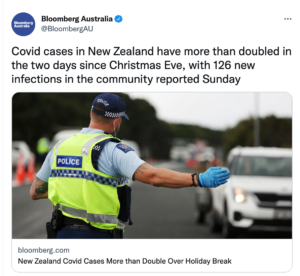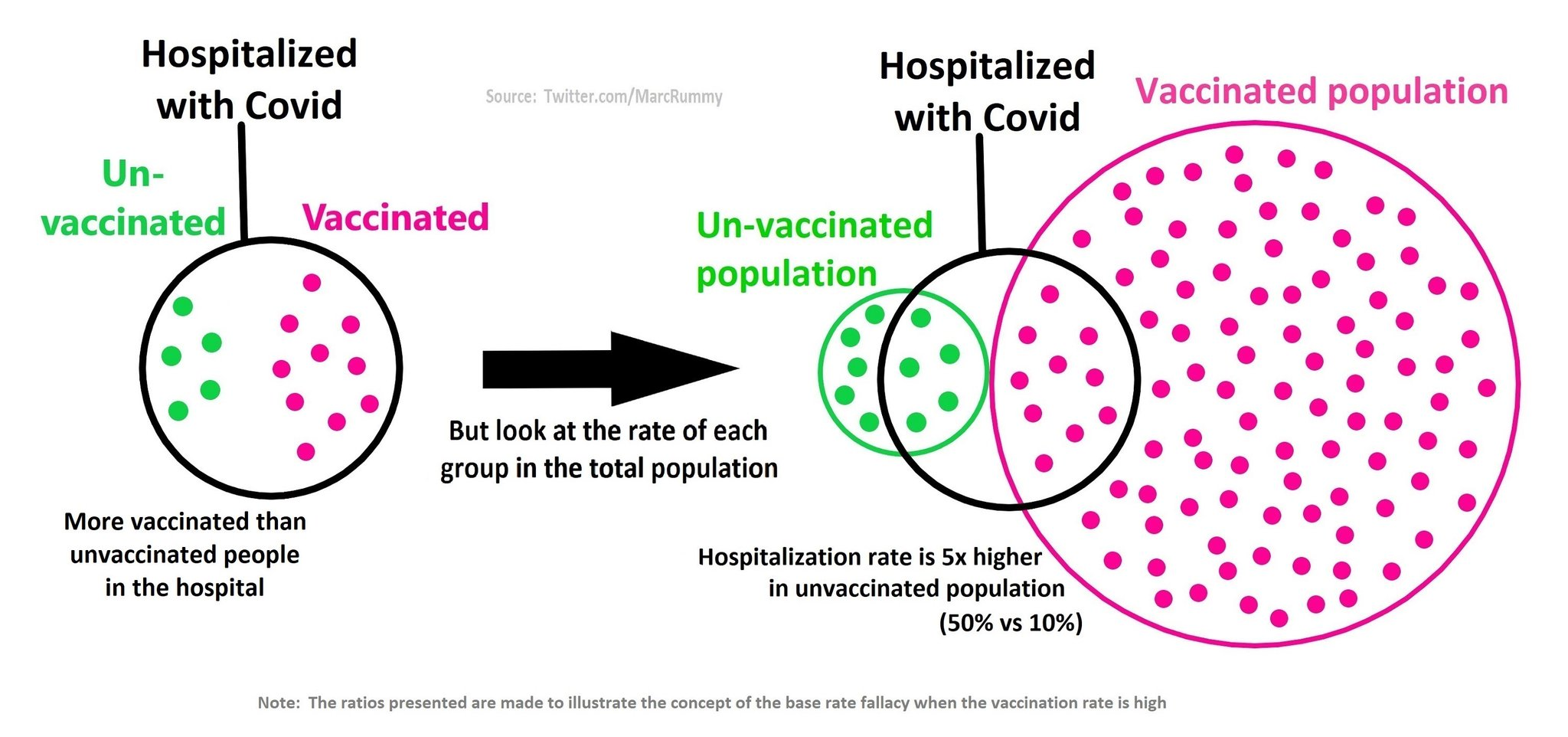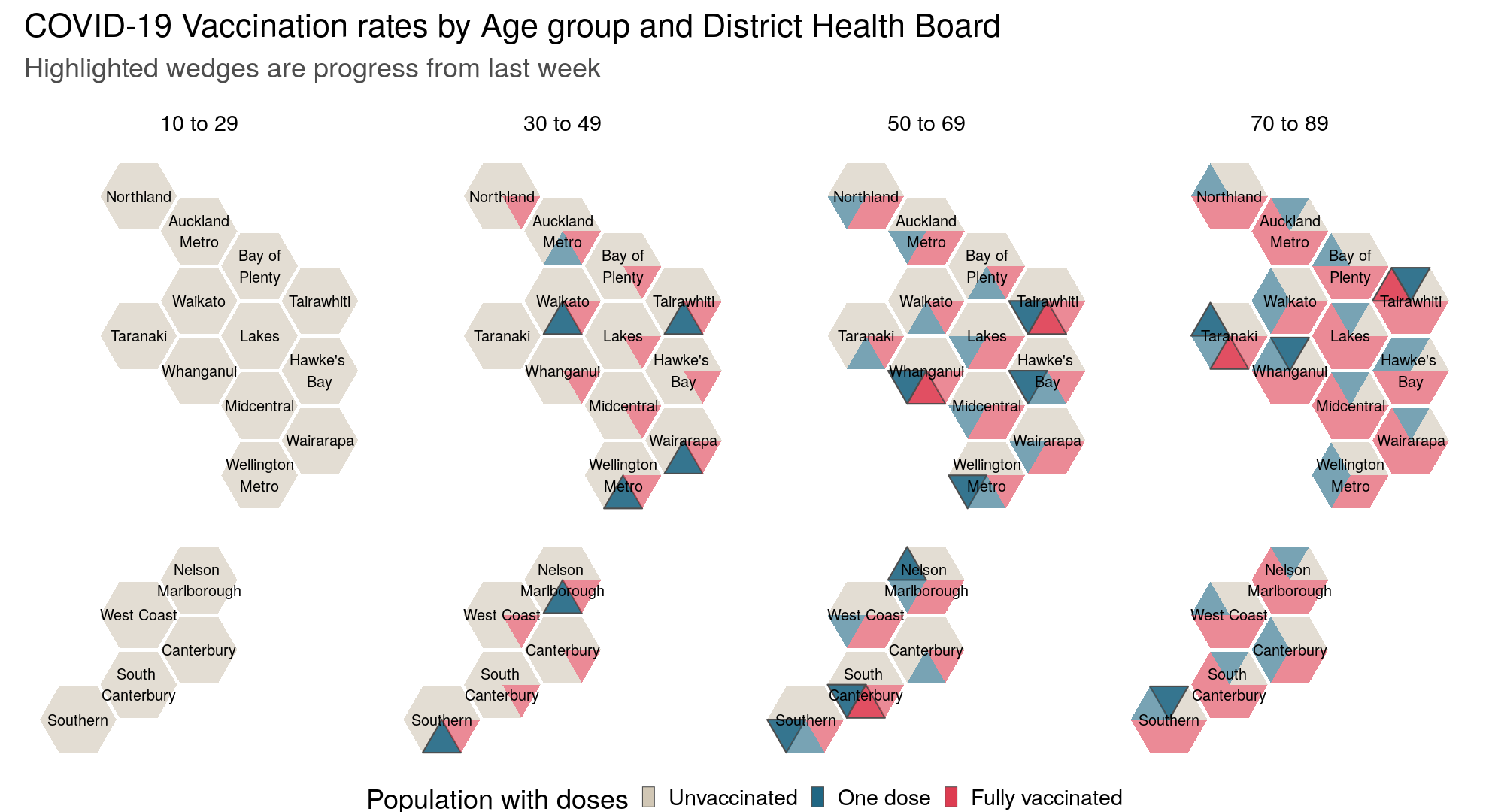Search results for briefly (337)
January 18, 2022
- Covid was the leading cause of death “in the line of duty” for US law enforcement officers. (Also, the report giving the numbers had this graph

The ‘Covid-19’ section of the bar, which should be nearly two-thirds of the total, is less than half)
- An attempt to check up on a sample of India’s forest-planting program
- Story on vaping from the Herald: it appears an Asthma and Respiratory Foundation survey gets very different results from the NZ Health Survey on the proportion of teens who vape daily. That’s pretty concerning: 5.8% vape daily vs 20% ‘addicted’ means at least one of the surveys is badly wrong.
- People are more likely to trust pretty graphics (separately from other reasons to trust the information)
- Overestimating ‘incidental’ Covid diagnoses in London hospitals
January 12, 2022
- Last June, the FDA approved a medication for Alzheimer’s Disease, although a lot of people, including their external advisory committee, thought there wasn’t convincing evidence that it works. The Centers for Medicare & Medicaid Services, the organisation that would be paying for a lot of this treatment, have decided they need some randomised trials showing that the treatment is safe and effective, so they have said they will only fund the treatment in trials.
- According to Pew Research, “Overall, about half of U.S. adults (48%) say that most things in society can be clearly divided into good and evil, while the other half (50%) say that most things in society are too complicated to be categorized this way.” This is another example of a survey question where only differences or changes are really meaningful and we can’t straightforwardly interpret the absolute value. I mean, how about “eggplant” or (for something more obviously socially constructed) “driving on the left-hand side of the road”. I would have said a lot of things in society have no particular moral valence, but also it’s not clear how you’d categorise “most” in cases where “good or evil or complicated” is a genuine question. The differences between groups are still potentially interesting, as might be changes over time.
- Not precisely ‘statistics’ or ‘in the media’, but a YouTube video of Adam Savage (Mythbusters) talking about measurement via Graeme Edgeler
- I gave a talk about StatsChat at a conference on undergraduate statistics and maths teaching
December 27, 2021
- Arithmetic fail by Bloomberg Australia: 126 cases over two days is not ‘more than double’ 62 cases in one day.

They’ve since edited to “N.Z. Adds 126 Cases in 2 Days…New Zealand’s daily toll of new local infections has risen from the 62 reported on Dec. 24.”, which is at least arithmetically correct, since 2×62 is 124, and 126 is larger than 124. Interestingly, the story now says “(Updates with state case numbers in third paragraph)” but doesn’t mention the correction to the maths
- The Washington Post reports on using convalescent plasma — antibodies from people who’ve recovered — to treat Covid. A new trial has positive results, but the story seriously underplays the previous trials with negative results. The story emphasizes that we’re short of treatments for Omicron so a new treatment would be more valuable, but that’s only true if it works, which is what’s in doubt
- Cruise ships are getting Covid outbreaks. Ok, yes, I’m shocked too. More seriously, the problem is numbers. There were 3500 people on the ship. If each one is 99.95% sure to be Covid-free, that still comes to more than one expected case. At the sort of Covid prevalences the US has now, symptom screens and pre-departure tests aren’t good enough to get a high probability of a safe cruise.
December 19, 2021
- Pfizer’s vaccine trial in kids 2-5 years old wasn’t successful: the dose (1/10th adult dose, 30% of 5-12yr dose) seems to be too low. They will try a three-dose series. It did work in 6-24 months kidlets. Pfizer is also testing third-dose boosters for all child age ranges
- “Why trust and transparency are vital in a pandemic” from the UK Office of Statistics Regulation. They note “It will not always be possible to publish information before it is used publicly. In these cases, it is important that data are published in an accessible form as soon as possible after they have been used, with the context provided and strengths and limitations made clear. “
- Lee Wilkinson, a pioneer in statistical computing and graphics, passed away on December 10. Among other influential contributions, he developed the statistical package ‘Systat’ and wrote ‘The Grammar of Graphics’
- Florida is a counterexample to correlations between Covid vaccination and politics in the US. That seems to be partly because their data are wrong. “People age 18 and over in the 33122 area code had more than a 2,700% vaccination rate, according to the data….’That’s the airport,’ Gelber said.”
- Via Jenny Nicholls on Twitter, a Washington Post story on injuries from bouncy castles. The story quotes the number of injuries as 82,203 from 2008 to 2013 and as one every 46 minutes in 2013. You might think about whether these are compatible and which sounds bigger. It also works out as about 0.2% of the roughly 8 million unintentional injuries in kids leading to emergency department visits. Which I think is more than I’d expect
December 10, 2021
- From Ars Technica, Report reveals which sealed NES games are the rarest of the rare. This is relevant because most of the story is about selection bias “Wata’s sealed-NES report, for instance, only shows one graded, sealed copy of Jeopardy!, a game that most collector’s regard as pretty common.
This disparity could be because sealed copies of Jeopardy! happen to be much rarer than open boxes or loose carts. Or it could simply be that almost no one has bothered going through the time, expense, and hassle of going to Wata for a professional grade on a relatively ignorable game like Jeopardy!.“
- Phillip Bump, of the Washington Post, is starting a newsletter “How to read this chart“
- NZ police release an independent report on facial recognition technology
- The police, and various other agencies, have asked the Ministry of Health for data from Covid contact tracing. They were (correctly) turned down.
- According to UK supermarket chain Tesco, via Wales Online, 33% of people in London and 39% of 18-24 year olds in the UK celebrate Thanksgiving. I’m reasonably sure this isn’t true, but it doesn’t seem possible to find out any more about where they got the numbers.
- NZ Herald, Nov 22 “Auckland CBD sinking into anarchy and resembling 1980s New York, city leaders told. Newsroom, Dec 6, “yeah nah”

November 30, 2021
- Is Covid Omicron going to be a gentler, kinder virus? Actually, we have no idea at all yet, as David Welch tells Jamie Morton. Worry about something else for a week or two; there’s no shortage of world problems. Also, see Trevor Bedford on Twitter.
- The Statistics Act (1975) is up for revision. You have until 22 December if you want to make a submission on the current Data and Statistics Bill. If you read StatsChat, it’s possible that you do want to comment.
- Story in the Herald saying that healthy diets are better for the environment. I probably won’t write about this one in detail, but you might look at this 2015 post on a Herald piece saying healthy diets are worse for the environment.
- ” if passes weren’t going to be checked, they may not represent a justified privacy breach.” Andrew Chen (the patron saint of the NZ Covid app) in a Newsroom story on not requiring vaccine pass validation.
- Not precisely statistics or in the media, but visualisation: Assyrian low-relief carvings with (possibly) their original colours
- If you want to read a careful and thoughtful analysis of the data on ivermectin for Covid then I’d actually advise not bothering, but this is a good place if you really have to
- A nice illustration (via Twitter) of why you’d expect quite a few vaccinated Covid cases if you have a lot of vaccinated people

September 9, 2021
- Good Herald piece on the Covid network contagion model
- Andrew Chen organised a bunch of people to write a letter about privacy for Covid location data. He’s also been saying the same things to journalists. It’s not that we think the government has any intention of misusing the data or letting the private sector misuse it, but the protections aren’t all that strong, the data collection is not voluntary, and having high-quality data is very important.
- There’s an interesting poll on US vaccine attitudes from the Washington Post and ABC News. Highlights: 82% of unvaccinated people said the FDA full approval for the Pfizer vaccine won’t make any difference to their decision. Crosstabulations (don’t you love polls with actual detail) showed 18% of unvaccinated respondents were in favour of requiring vaccination for school teachers and staff, and 15% requiring vaccination for students when a vaccine is approved at their age. 72% of those employed by someone else and not vaccinated said they would resign if required by their employer to be vaccinated. Politics site The Hill headlined this as Over 70 percent of unvaccinated Americans in survey would quit their job if vaccines are mandated, which is unlikely to be true — it’s a lot easier to claim to a poller you’d quit than to actually do it.
- Derek Lowe writes about bad clinical trials in Covid “I’m all for trying out new ideas – that’s essential, in fact. But try them out for real. … If you’re going to do research on human beings, you owe it to the subjects of your trial and to the rest of the medical community – and to the rest of the world, in this case – to do it right. To ask solid questions and get solid data on them that will allow you to make a real decision at the end of it.”
- Animation of vaccination progress in NZ (from Jonathan Marshall)
July 29, 2021
- Queueing theory is a branch of applied probability and so is StatsChat relevant. Tava Olsen, a professor in the UoA business school, was interviewed on RadioNZ about the MIQ booking system and wrote for The Spinoff. (disclaimer: I recommended her to RadioNZ)
- Matt Nippert writes in the Herald about Pharmac and — unusually for a story about Pharmac — looks at the tradeoffs involved in what they choose to fund.
- Via Axios: JAMA, the medical journal, requested revisions to the research paper with data supporting approval of aducanumab for Alzheimer’s disease. That’s pretty standard. Apparently the company said “Nope” and will look for a different journal. This isn’t unheard of — sometimes, reviewers are just wrong and you try another journal — but it is another unusual occurrence.
- Mediawatch reported that economic forecasts are often wrong. That’s not really surprising: economics says that (a) recessions are unpredictable and (b) if economists benefit from their forecasts being mentioned in the news they will tend to produce newsworthy forecasts. I suggested that the forecasts should come with uncertainty intervals, so we have some ability to tell if they’re bad at forecasting or it’s just that the economy is uncertain.
July 15, 2021
- From Radio NZ: an exegesis of the non-quantitative weakly graph-like thing that accompanied information about NZ vaccine rollout plans in March. This was unusually bad for a graph from the NZ public service, but I think the story is overthinking it.
- The FDA approval of aducanumab for Alzheimer’s disease seems may have been procedurally a bit dodgy as well as scientifically dubious. (STAT($), Washington Post)
- photochrome.io will take a word or phrase and give you a colour palette based on photos found using the word/phrase
- “Why are gamers so much better at catching fraud than scientists?” (I don’t think they are; they just care about it more)
- The US is having problems getting new electorates laid out because of the Census delays. In NZ, one of the constraints on the Census 2018 data quality improvement process was that it absolutely positively had to be done in time for the Representation Commission to make electorates.
- A twitter thread on finding evidence of secret US flights into Australia. Only not.
- Why housing costs aren’t in the Consumer Price Index (but are in other indexes, which you might want to use instead)




